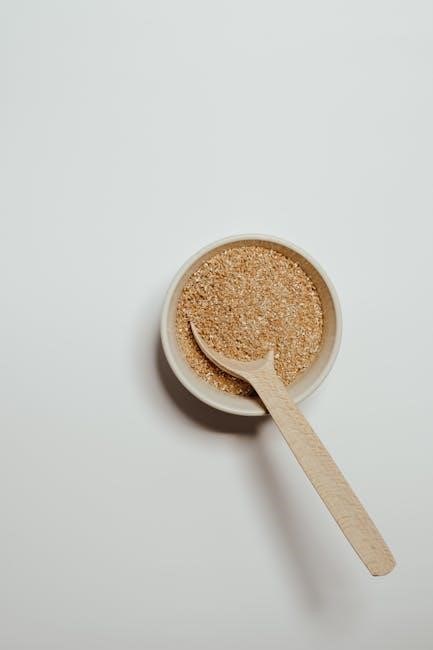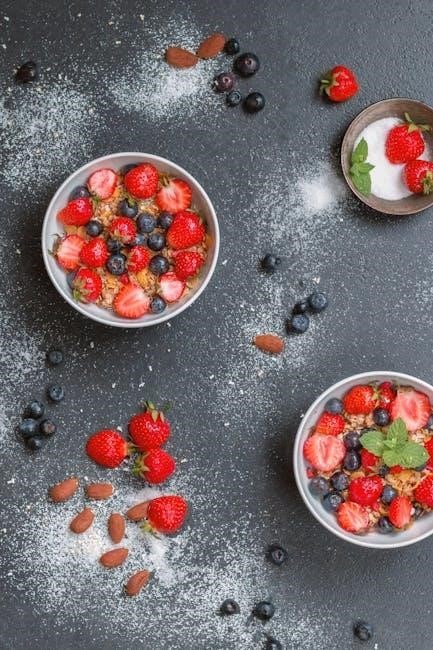The no sugar diet is gaining popularity as people seek healthier lifestyles. It focuses on eliminating added sugars, promoting whole foods for better health, energy, and mental clarity, supporting overall well-being naturally.

1.1 Understanding the Importance of Reducing Sugar Intake

Reducing sugar intake is essential for maintaining optimal health and preventing chronic diseases. Excessive sugar consumption has been linked to weight gain, energy crashes, and increased risks of diabetes and heart disease. The NHS recommends limiting free sugars, as the UK faces a significant sugar-related health crisis. Simple carbohydrates and added sugars in processed foods are major contributors to poor dietary habits, making it crucial to focus on whole, nutrient-dense foods instead. By cutting down on sugar, individuals can improve digestion, boost energy levels, and support mental clarity. This approach also helps reduce inflammation and promotes healthier skin. Additionally, lowering sugar intake sets a positive example for children, fostering better eating habits from an early age. Understanding these benefits encourages a long-term commitment to a no-sugar lifestyle, leading to overall well-being and disease prevention. It’s a foundational step toward adopting a balanced diet that prioritizes health and vitality.

1.2 Benefits of a No Sugar Diet

Adopting a no sugar diet offers numerous health benefits, including improved energy levels, clearer minds, and enhanced overall well-being. By eliminating added sugars, individuals can reduce their risk of chronic diseases like diabetes and heart conditions. The diet promotes weight management by curbing cravings and stabilizing blood sugar levels. It also supports healthier skin and reduces inflammation, which can alleviate conditions like acne and joint pain. Additionally, a no sugar diet encourages better digestion and boosts the immune system by focusing on nutrient-rich, whole foods. Many people report feeling more energetic and mentally sharp after cutting out sugar, as their bodies rely less on sugar spikes for energy. This lifestyle change fosters healthier eating habits and can lead to long-term improvements in both physical and mental health. By prioritizing whole foods and natural ingredients, individuals can achieve these benefits while enjoying flavorful and satisfying meals.
Foods to Include in a No Sugar Diet
A no sugar diet emphasizes whole, unprocessed foods like vegetables, lean proteins, whole grains, and healthy fats. These foods provide essential nutrients, fiber, and natural flavors, helping maintain stable energy levels and overall health.
2.1 Protein-Rich Foods
Protein-rich foods are a cornerstone of a no sugar diet, providing essential amino acids and helping maintain muscle mass. Include lean meats like poultry, fish, and ruminant meats, as well as eggs, cheese, and yogurt. Seafood, such as salmon and shrimp, offers additional omega-3 benefits. Plant-based options like beans, lentils, and tofu are also excellent choices. These foods keep you full, stabilize blood sugar levels, and support overall health. Opt for unprocessed varieties to avoid hidden sugars. Incorporating a variety of protein sources ensures you meet nutritional needs while adhering to the no sugar diet principles. Pairing protein with vegetables or whole grains creates balanced meals. Remember, protein helps reduce cravings for sugary snacks and supports energy levels throughout the day.

2.2 Vegetables and Fruits
Vegetables and fruits are essential components of a no sugar diet, offering natural sweetness without added sugars. Focus on low-sugar vegetables like broccoli, spinach, cauliflower, and carrots, which are rich in fiber and nutrients. Fruits such as berries, apples, oranges, and citrus varieties are ideal, as they provide antioxidants and satisfy sweet cravings. Avoid high-sugar fruits like grapes and cherries. Incorporate a variety of colorful vegetables and fruits to ensure a broad range of vitamins and minerals. Pairing vegetables with healthy fats or proteins enhances satiety and balances meals. These foods support digestion, energy levels, and overall well-being, making them a cornerstone of a sugar-free diet. Aim for seasonal and organic options to maximize nutritional benefits and flavor. Balancing vegetables and fruits helps maintain a healthy diet while minimizing sugar intake.

2.3 Whole Grains and Alternatives

Whole grains and their alternatives are excellent choices for a no sugar diet, providing sustained energy and essential nutrients. Opt for quinoa, oats, barley, buckwheat, rye, amaranth, farro, millet, and couscous, which are rich in fiber and naturally low in sugar. These grains help regulate blood sugar levels and promote satiety. Avoid refined or processed grains, as they often contain added sugars or lose their nutritional value during processing. Whole grains also offer vitamins, minerals, and antioxidants that support overall health. For those with dietary restrictions, gluten-free or low-carb alternatives like cauliflower rice or zucchini noodles can be great substitutes. Incorporating these grains into meals adds variety and ensures a balanced diet. Pair them with protein or healthy fats to enhance their nutritional benefits and keep meals satisfying. Whole grains and alternatives are versatile and align perfectly with the principles of a no sugar diet, offering both nourishment and flavor.
2.4 Healthy Fats and Oils
Healthy fats and oils are essential for a balanced no sugar diet, providing sustained energy and supporting overall health. Nuts, seeds, avocados, and olive oil are excellent sources of healthy fats that are naturally low in sugar. These options help reduce inflammation, improve heart health, and enhance the absorption of fat-soluble vitamins. Avocados, for instance, are rich in monounsaturated fats and fiber, making them a great addition to meals. Olive oil, coconut oil, and avocado oil are ideal for cooking and dressings, as they are free from added sugars and promote a healthy metabolism. Avoid processed or hydrogenated oils, as they can contain harmful additives. Incorporating these fats into your diet not only adds flavor but also helps maintain satiety, reducing cravings for sugary snacks. Healthy fats and oils are versatile and can be easily integrated into meals, supporting both nutrition and taste in a no sugar lifestyle.

Foods to Avoid on a No Sugar Diet
Avoid processed and refined foods, sugary snacks, and beverages with added sugars. Limit high-sugar fruits, simple carbohydrates, and foods with hidden sugars to reduce health risks and improve energy levels naturally.
3.1 Processed and Refined Foods
Processed and refined foods are among the top culprits in a no sugar diet due to their high content of added sugars and artificial ingredients. These foods, such as sugary snacks, baked goods, and sweetened beverages, often contain hidden sugars under various names like high-fructose corn syrup or dextrose. Refined carbohydrates, such as white bread and pasta, quickly convert to sugar in the body, causing blood sugar spikes. These foods are typically stripped of nutrients and fiber, making them less satisfying and contributing to overeating. Many processed foods, such as granola bars, cereals, and canned goods, may seem healthy but are often loaded with added sugars. Eliminating these from your diet is crucial for maintaining stable energy levels and reducing inflammation. Opting for whole, unprocessed foods like vegetables, meats, and whole grains ensures you avoid unnecessary sugar intake and promotes better overall health. Always check food labels to identify and avoid hidden sugars in processed items.
3.2 High-Sugar Fruits and Vegetables
While fruits and vegetables are generally healthy, some contain high natural sugar content, which may not be suitable for a strict no sugar diet. High-sugar fruits like bananas, grapes, and mangoes should be consumed in moderation or avoided, as they can significantly impact blood sugar levels. Similarly, certain vegetables such as corn, peas, and sweet potatoes have higher sugar content compared to leafy greens like spinach and broccoli, which are lower in sugar and richer in fiber. Even though these foods contain natural sugars, overconsumption can hinder progress for those aiming to minimize sugar intake. It’s important to balance the intake of these foods and prioritize vegetables that are lower on the glycemic index. Portion control and mindful eating are key to enjoying these nutrient-rich foods without compromising dietary goals. Always consider the sugar content when incorporating fruits and vegetables into your no sugar diet plan to maintain optimal results.
3.3 Simple Carbohydrates
Simple carbohydrates, such as refined sugars and white starches, are a key focus of the no sugar diet. These carbs are quickly broken down into glucose, causing rapid spikes in blood sugar levels. Foods like white bread, pasta, pastries, and sugary snacks fall into this category. They are often stripped of nutrients and fiber, making them less satisfying and more likely to lead to overeating. The no sugar diet advises avoiding these foods to stabilize blood sugar, reduce cravings, and promote better energy levels. Instead, individuals are encouraged to opt for complex carbohydrates, such as whole grains and vegetables, which digest more slowly and provide sustained energy. By cutting out simple carbs, dieters can achieve a more balanced nutritional intake and support their overall health goals. This approach helps minimize the negative effects of sugar while fostering a more mindful and healthier eating habits. Simple carbs are a primary target for elimination in this diet plan.

